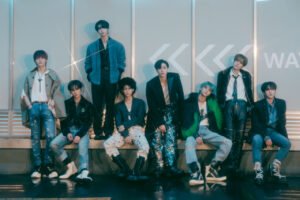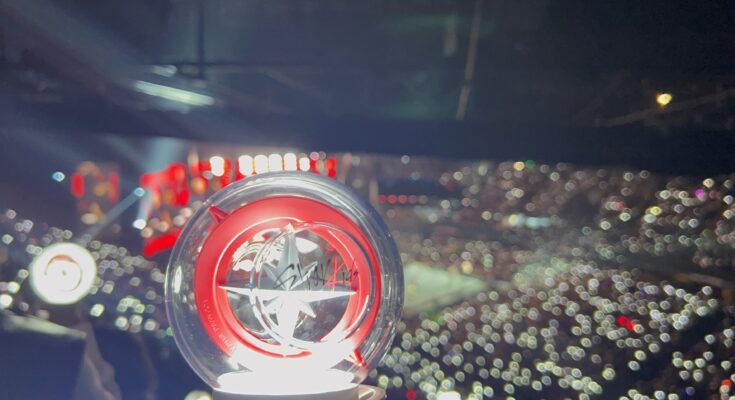Korean Pop has been around since the 1980s, but it wasn’t until 2017-18 that its popularity began to rise. Big idol groups known as EXO, Blackpink, Twice, Stray Kids, New Jeans, GOT7, and many more have gained large groups of fans due to Western recognition with the boy group, BTS.
After BTS’ performance at the AMA’s in 2017, the American music industry began to recognize them as valid artists for western media and more people began to listen to the genre. Since then, there has been huge outpourings of support for he BTS music and concurrently a hate — or stigma — has become prevalent in the industry. It is common to hear remarks that show a strong dislike for the newly popular genre, whether these remarks be about the Korean idol image, Korean fashion, or any other stylistic choices that may differ from that of Western music industry.

Photo of boy group SuperM merch and promotions by Joel Muniz.
In K-pop culture, there is an idol system that is not common in Western society. The Korean idol image is one of the most discussed aspects for all of the different groups in K-Pop. American music often depicts women in sensual demeanors, while contrastingly depicting men as more masculine and rough. This differs in Korean culture where the K-Pop female artists are often depicted as cute and small for fans to idolize. Male K-Pop artists are often more femininely dressed than in the United States, and often wear makeup or dye their hair. These stylistic differences in appearance develop into stigmas that garner a lot of backlash and belittling from American listeners.
“You Don’t Even Know Korean.”
Another stigma would be the language barrier. The constant questions asked to K-Pop fans are, “Do you even understand them? Why do you even listen to Korean music?”. These questions can be disheartening for some to hear. It is unsettling to listen to such remarks being made since music ultimately drives people and not the language. A language barrier should not be a deciding choice on whether you listen to a type of music.
Music is Universal
High School Senior Jizela Canales elaborates on this topic, saying, “People like what they like, and it’s just music. There is not much we can change, but I’ve never heard many people make fun of it, and if haters end up listening to it, they tend to like it. Korean, English, Spanish, or whatever language it is, music is universal.”.
Canales’ point that music is universal highlights this language stigma and the need for change in perspective. Having an understanding of the Korean language is an asset in this situation, but ultimately the groove of the music is what turns people in their direction.

Picture of Stray Kids Album Photos. Courtesy by JYP Entertainment.
The Stigma of Korean Pop
The stigmas against K-pop have caused many to steer away from the genre because they don’t want to be roped into the cultural strife between the two music industries: Korean and American. There should not be a stigma against a genre of music because music should be universal, which Canales does a good job of expressing. I implore you to not only be dissuaded by cultural differences in music, but to also be encouraged by cultural differences in music and allow them to grow your musical interests. Whether that be R&B, K-Pop, Folk, Hip Hop, or other genres, there is so much more that can be enjoyed.

 The Liturgical Calendar: Should Christians Observe It?
The Liturgical Calendar: Should Christians Observe It? Embracing Authenticity in the Pursuit of Success: A Reflection on Journalism, Education, and Meaningful Academia
Embracing Authenticity in the Pursuit of Success: A Reflection on Journalism, Education, and Meaningful Academia Spring Concert: Music From Around the World
Spring Concert: Music From Around the World Recycling on College Campuses
Recycling on College Campuses
Leave a Reply